What is the point of a gay love story in the middle of a fungus zombie apocalypse?
I would fall in love with Murray Bartlett because he looks like a really fungi
Significant spoilers for The Last of Us episode 3 ahead
By now, you’ve probably seen the breathless reception to the recent episode of The Last of Us, Long Long Time, a stunning and tender departure episode that takes a break from the main storyline and lets us sit in a gorgeous and bittersweet 20 year love story.
We follow Bill (Nick Offerman) and Frank (Murray Bartlett), as they have a post-apocalyptic meet-cute (Frank falls into one of Bill’s zombie traps, the original clumsy rom-com girl), fall in love, manage to create a life together (and not just… survive), fight off zombies and human raiders, be domestic, and then get old, and sick, and finally choose to die together.
I cried in the middle of the day while I was watching it, making this maybe the third or fourth cultural artefact to manage the feat of pushing through my toxic masculinity and inherent stoicness. Even though I could sense the euthanasia moment being built, and knew the moment it would be verbalised, it was Nick Offerman’s reaction that gut-punched me. I thought it was a sensitive and nuanced story, gorgeously acted, and which provided great depth and thematic weight to the show.
It was not only an extremely emotionally affective story, all the beats and sad piano soundtracks and tender kisses and acts of strawberry service – it was a defined narrative choice, which a lot of people seem to be missing.
The rise of zombie daddy
I read one article which equated this episode as being an unearned and cynical play for prestige television status – essentially reading the choice to depart from the main plot and explore this gay love story as something quite cheap and manipulative.
I think this shows a fundamental misunderstanding of the narrative purpose of this episode. There’s a justification simply in the fact that this episode, as a stand-alone story, was beautifully told, and worth existing on its own. But it doesn’t exist unconnected from the greater plot (the episode is bookended by Joel and Ellie’s journey), and most importantly, it’s not disconnected from the greater narrative arc.
Narrative progression isn’t always achieved through plot progression, and certainly not linear plot progression. That’s just the most obvious and easily recognisable way that we advance a story - what Long Long Time does is identifies major points in character and theme that need expanding, and uses Bill and Frank’s story to illustrate that. Thematically, this show is very much about hope - Ellie represents a kind of hope that Joel in particular finds hard to reconcile with his wounded view of the world. Can she really cure the zombie apocalypse? Is it worth putting yourself into the physical and emotional danger that having hope causes?
But that’s also broad scope hope, hope for humanity at large– what Bill and Frank’s story seeks to illustrate is that in this world there is still personal hope, still reasons to live during the horror and unrepentant mushroom of it all, in the magic of human connection, of vulnerability, of love. That is going to be a massive theme moving forward - and one intricately linked to character advancement. Why do we (humanity) keep going? But also specifically, why does Joel keep going?
Right now, we’re trying to find Joel’s character motivation. He’s cast as the grump, the cynic, the realist, who isn’t ready to take the plunge into believing Ellie can save the world. Every step is defined by small goals for him – surviving, getting a car battery, finding his brother. But throughout this episode, we explicitly see the connection made between Bill and Joel – Bill talks about Frank as his “purpose”, and his reason to live being to protect him. Joel, who has already “failed” in that purpose once, losing his daughter in the very first episode, is going to be a reluctant wearer of that same mantle with Ellie. But he will do it – not because I know what’s going to happen because I’ve played the game (I haven’t, I’m a cool jock who doesn’t play computer games) but because that’s the narrative arc. This episode did more to illustrate and progress and deepen the show’s attitude to character and theme than several linear episodes could.
We’re going to get zombie daddy soon - a man who will find purpose and growth and personal hope through his relationship to Ellie, and this episode was the soil to grow him in.
The gift of a private moment
Apart from the homophobes review-bombing the episode, there’s been a lot of praise of how gorgeous and gay the relationship between Bill and Frank is, and how it manages to escape the kill your gays trope (it does so in a range of different ways, but one of the most compelling is that the nature of this storyline, love in the apocalypse, is inherently linked to death - so if the relationship had been straight, it would have served the same purpose). This article in Slate beautifully expresses everything this depiction of a gay relationship gets right, and why it’s resonated with so many people.

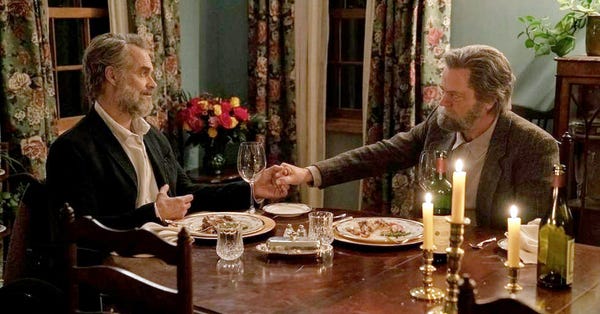
I’ve been wondering about whether there’s an inherent purpose to the queerness of this plotline, relating to my thesis on narrative progression. To be clear, I don’t think there needs to be - queerness is not inherently a device to be employed, it can just be representational of different types of relationships that exist in the world. There doesn’t have to be a point, political or other, with having two men fall in love. Unfortunately, as the homophobic reaction proves, simply choosing to depict gay relationships is still a political act in itself.
But is there any form of efficacy that this queer relationship brings to the themes of the show, to the story they’re trying to tell? I think perhaps there is, and it’s in the poignancy and power of a private moment through a queer lens.
In this episode, we see the full scope of this relationship, the bittersweet arc of two people’s love. It’s beautiful, and tragic, and hopeful all at once. It’s a montage, a summary, but we are shown key moments to try to fill in the full picture of essentially a life together. We are given a window into their privacy, their intimacy, and the cogs and wheels of their affection for each other.
This kind of intimacy is still not something we see a lot of when it comes to gay men, and other queer relationships on screen. We’re still in the early days of full representation, and so much of what we have traditionally seen of queer lives on screen have been dictated and filtered by straight people, or modified for straight audiences. Treating a nuanced and complicated queer romance with respect and space - and in a not-inherently queer for queer medium like a zombie apocalypse game adaptation - is new enough that it’s worthy of note.
But more than that, queer relationships of every type are scrutinised. It’s one of the reasons why queer is such a relevant umbrella term still – anything outside of straight is still noted upon, commented upon, criticised and policed. Often this leads to expectations of what queer relationships should look like - and also a performative component to just being in a queer relationship. Like the above point - being queer and in love shouldn’t be a political statement, but just doing it is still considered as one. What this means is that just existing, just being outside and living your life, and in a queer relationship, means that you are always aware of being watched.
It means you control how you represent yourself to the outside world. I remember going on a date with a boy and going to kiss him in the street outside of the bar we’d had our date, and he got uncomfortable, and moved us back into the bar for the privacy it afforded. Later, outside that same bar with a different guy ( slut era!) a car slowed down and yelled slurs at us. I know multiple femme presenting couples who just don’t hold hands in places like public transport, because of the invitation to commentary and judgement it can bring. Even now, as a bisexual in a relationship, I’m used to people scrutinising the manifestations of my relationship - I recently had a TERF tweet about me dating a woman as a kind of gotcha moment, because she saw the manifestation of my relationship as performing differently to how she expected my stated identity to exist (TERFs are identity cops, and ACAB).
Because of this, a queer relationship does become performative, and often straight audiences expect palatable versions of that performativity when those relationships are depicted on screen. There’s nothing wrong with the formula of one sassy, bottom presenting queen in every relationship, for example - but there is when it’s expected to always be that way by a non-queer audience.
So what this leads to is the beauty and intimacy of private queer relationships. The way I found with some of the boys I dated that physical affection, and emotional intimacy only happened inside, away from other eyes, is heartbreaking. The way I’ve become someone who protects and guards certain aspects of my relationships (even as someone who often writes about my life and relationships) to escape falling into performative scrutiny traps. I think it’s a common theme across queerness, as a result of that scrutiny, of that constant perception. Just look at the language used about queerness - we’re always coming out, we’re always loud and proud. For a while, if you were an artist or public figure who was also gay, you were described as “openly gay”. Openly to who? To all the beady eyes of society.
There’s nothing wrong with being out and proud, but there is something wrong when anyone who is queer is meant to perform that role a certain way.
That’s why I loved having this window into the gorgeous queer privacy of Bill and Frank’s relationship. I won’t go into all the ways that they express the nuances of their homosexuality, but the growth of their private language, the tentative nature of their physicality, the reality of two older, bearded, hairy men kissing and showing love… that to me was a gift, and one of the reasons why Long Long Time affected me so much.
Getting a depiction of the private, inner working of a queer relationship - away from scrutiny (because of the apocalypse), tenderly and beautifully told, was a very special form of storytelling. There was something so intimate and truthful about this depiction. Something special about how we got to see the unique way these two people loved each other.
It also made it an effective tool as the narrative device in this episode – what better way to show that even when the world is crumbling around us, that it’s the private moments of love and intimacy that keep us human, and keep us alive? What better way to foreshadow the relationships that are going to bind and propel the rest of this show.
Welcome to our new All The Heterosexual Nonsense column, which is called Stupid! With Patrick Lenton, a fortnightly newsletter exploring the intersection of pop-culture, comedy, and queer stuff. Please subscribe if you liked it, and please share!



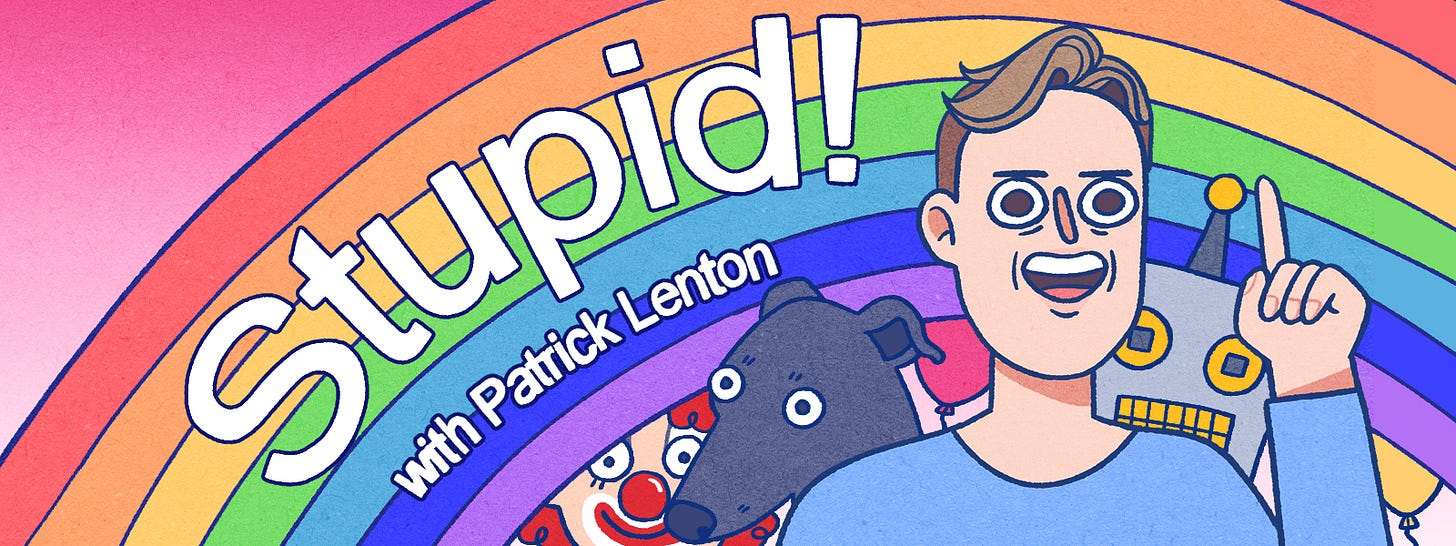

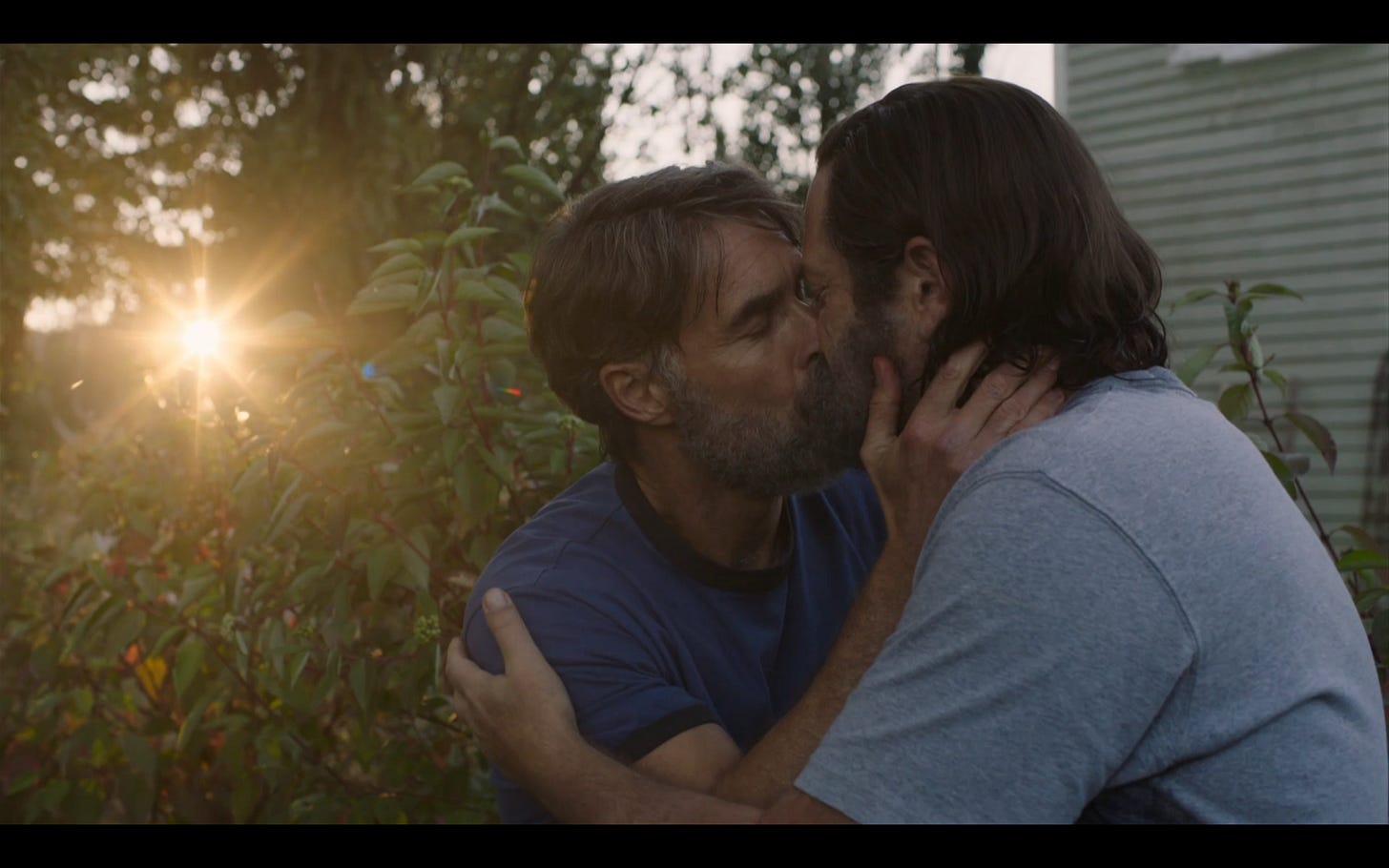
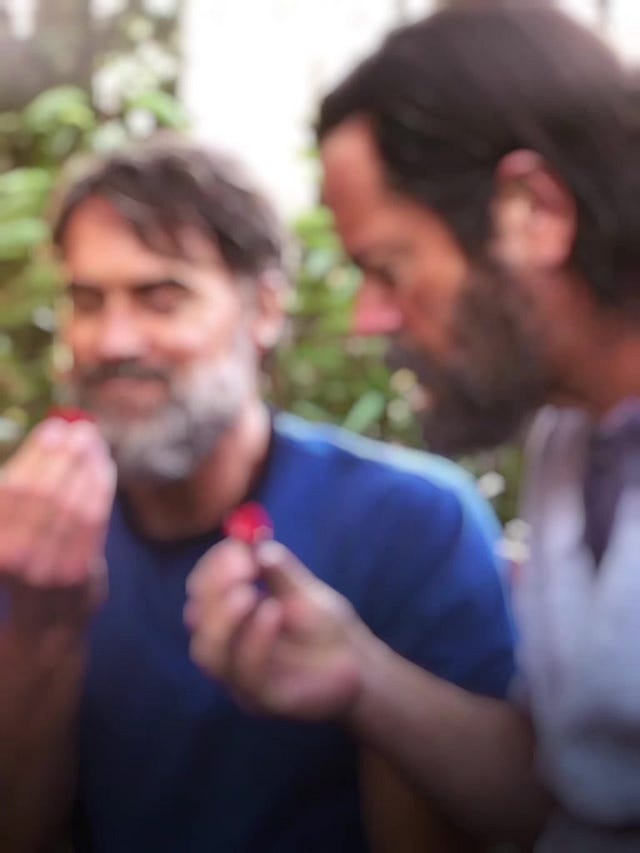

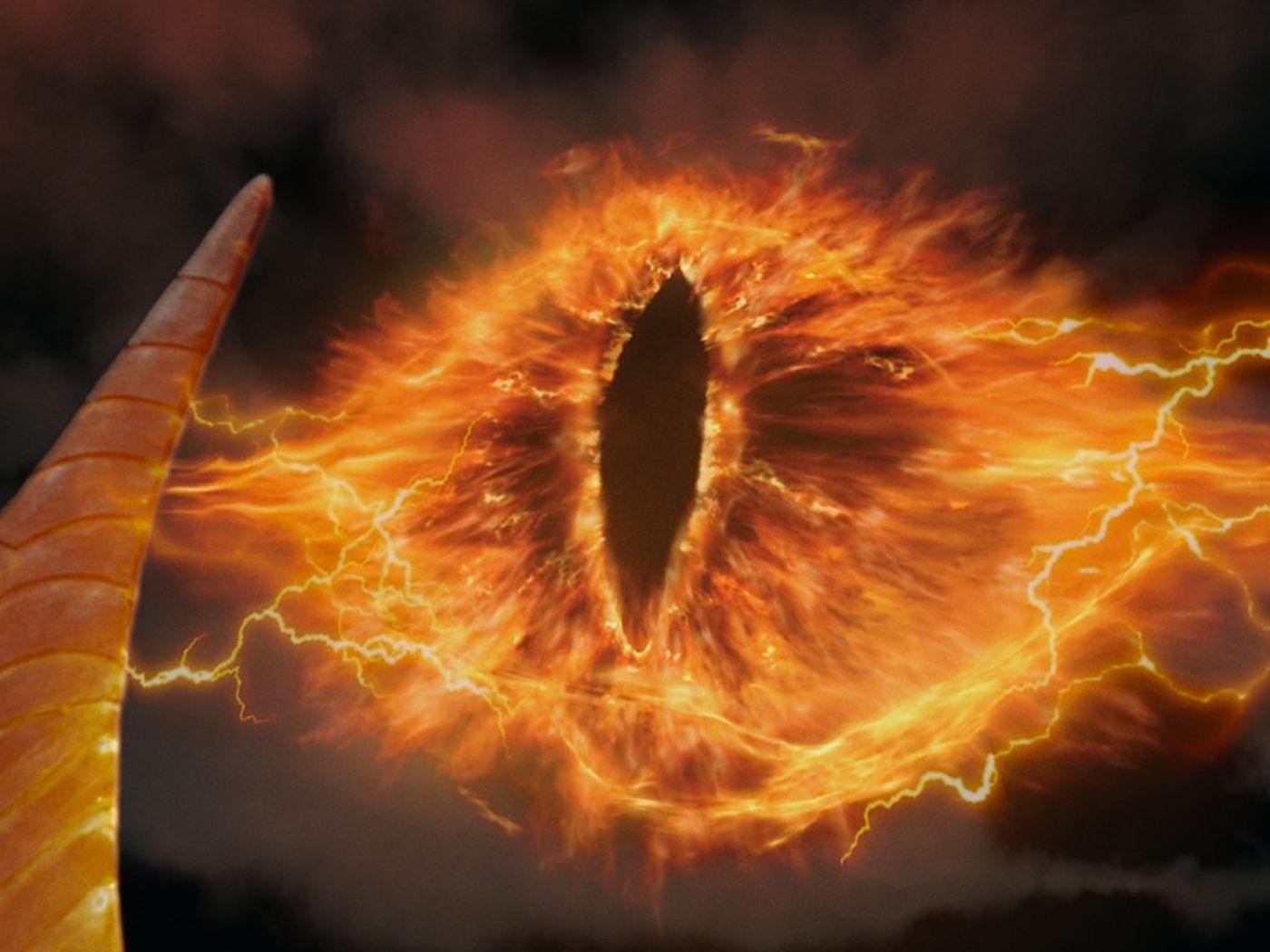
Your analysis is so beautifully put and I couldn’t agree more. ❤️🔥😭
Hi, is ACAB (I did google) about carrying bibles or Cops? Thx